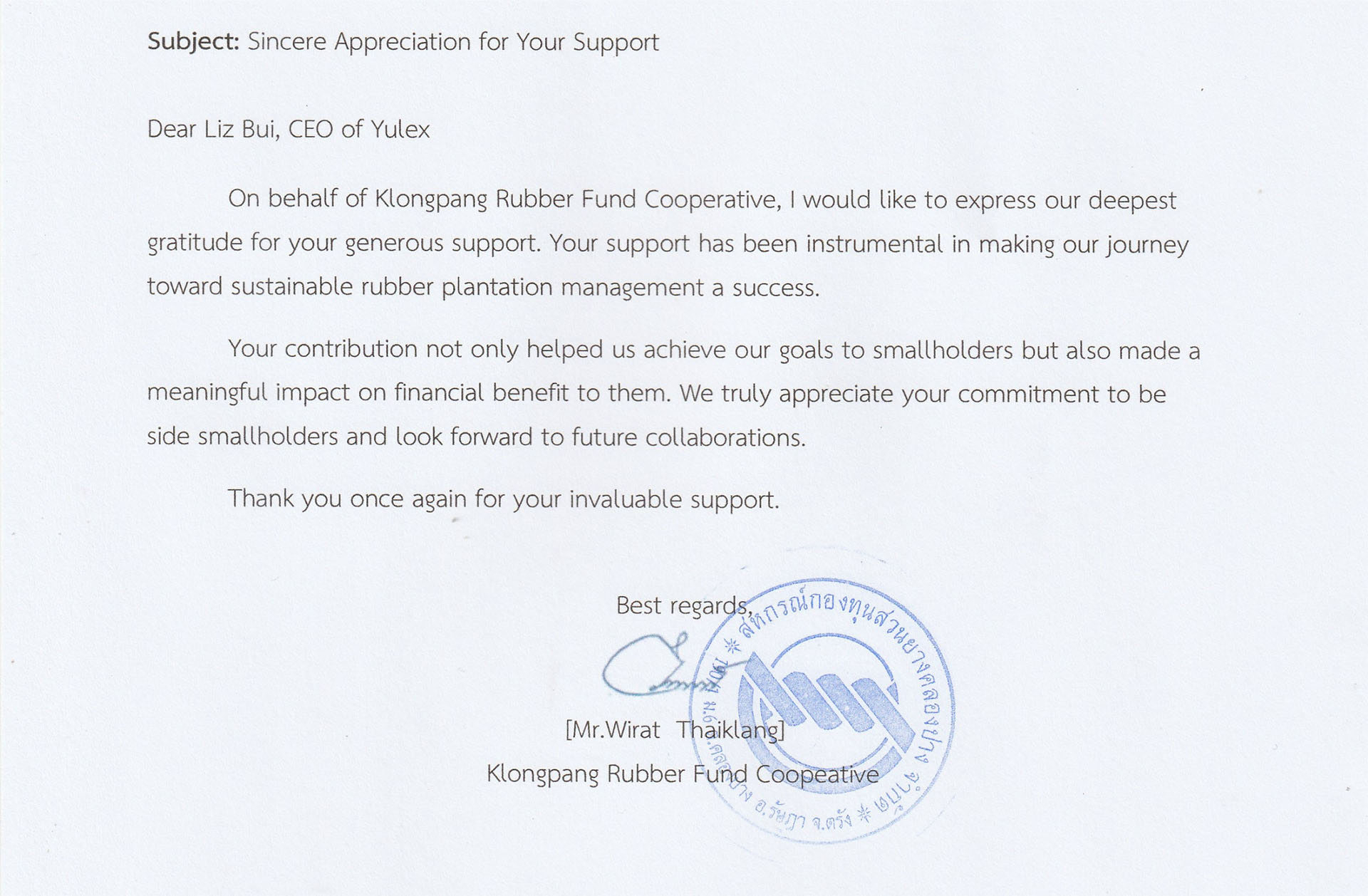
When Yulex launched its Equitable Agriculture smallholder profit-sharing program, our goal was based on our boots on the groundwork with them. It was simple: create a fairer, more equitable & sustainable future for natural rubber farmers. Smallholder rubber producers— who account for 85% of global rubber production—are often trapped in cycles of low pay, volatile markets, and limited access to resources like banking. By introducing a model that prioritizes profit-sharing, transparency, and long-term sustainability, we set out to change that.
In Thailand, smallholder rubber farmers are the backbone of the country’s natural rubber industry, with approximately 1.68 million smallholders cultivating around 3.9 million hectares—90% of the nation’s production. Despite their crucial role, these farmers often face economic challenges.
The average smallholder manages about 2.3 hectares (5.7 acres) of rubber trees and earns around $14 per day before costs. After paying for labor (tapper) or trader, net earnings can drop to $7 per day, which is $3.20 below the regional minimum daily wage of $10.22 in areas like Trang Province where our partner smallholder cooperative and members are located.
Additionally, rural incomes remain lower than urban ones- averaging just 68% of urban household earnings- highlighting the need for targeted support to improve smallholder livelihoods.
Yulex completed the development of its Thailand natural rubber supply chain in early 2023, primarily for our partner Decathlon, which licensed YULEX100 foam technology for watersports. This supply chain is open to other customers. Recently, we completed our first profit-sharing distribution. Yulex distributed over 50% of net sales to the Cooperative Fund Rubber Klongpang Limited (“Cooperative”). See proof of receipt of funds the Cooperative Chair in the letter below.

The Klongpang Cooperative in turn distributed these funds directly to participating smallholders in proportion to their participation. The Cooperative takes no fee to do this.
In total, 194,000 kg of PEFC-certified rubber was sold to Yulex customers in late 2023 and 2024.

In Thailand, cooperatives play a critical role in helping smallholder rubber farmers achieve PEFC (Programme for the Endorsement of Forest Certification) or FSC (Forest Stewardship Council) certification.
PEFC, in collaboration with the Thailand Forestry Certification Council (TFCC), supports group certification projects, including the Klongpang Cooperative’s certification of 1,000 hectares (2,471 acres). The initiative provides technical and financial assistance, market access, and sustainable forest management training. Without PEFC and the Cooperative’s support, it would be difficult (to impossible) for Yulex to collaborate directly with individual smallholders who are many and have varying capabilities and resources.
The Cooperative currently has 435 smallholder members, and accepts new members. For this first Equitable Ag distribution, the same 88 smallholders participated over the same period. See Table 1.
These smallholders’ own plots that range from 0.2 hectares (0.5 acres) to 6 hectares (14.8 acres). The average first planting year is 2004, but some plots date back to 1993, while others with second plantings as recent as 2020.
All smallholdings are deforestation-free under PEFC and EUDR (European Deforestation Regulation), with PEFC having a cut-off date that is stricter than EUDR, whose cut-off date is December 30, 2020. This date aligns with key global commitments to halt and reverse deforestation, including: i) EU’s Green Deal and 2030 Biodiversity Strategy; ii) UN Sustainable Development Goals (SDG 15); and iii) Glasgow Leaders’ Declaration on Forests and Land Use (COP26).
Trading and selling tree latex is complex and involves many stakeholders. Participation in Equitable Ag is entirely voluntary—neither Yulex nor the Cooperative selects nor mandates which smallholders participate. Those who do choose to sell their latex through the program also obtain higher payments above market rates for their certified latex compared to uncertified latex.
Traditional rubber supply chains leave smallholders with little bargaining power, forcing them to accept unstable prices set by intermediaries and the market. By aligning economic incentives with environmental stewardship, the Yulex Equitable Ag program helps farmers increase incomes while preserving their land for future generations.
Richard Laity, PEFC Southeast Asia Manager, stated,
“Smallholder communities encounter significant challenges when establishing connections in the market. Yulex’ dedication to aiding smallholders in Vietnam and Thailand will have a profound impact on the natural rubber community. Consumer brands in various industries will benefit tremendously from Yulex’ program. PEFC urges others to join them in enhancing the natural rubber value chain to support smallholder rubber farmers.”
Through Yulex’ Equitable Ag program, farmers gain direct access to brands and markets that value sustainable materials, helping to ensure a more resilient and equitable future for them and their communities.
1. AgroSpectrum Asia, June 2023, Vietnam’s Natural Rubber farmers benefit from a Smallholder Profit-Sharing Program agrospectrumasia.com
2. European Forest Institute (EFI), 2024, Briefing - Thailand’s natural rubber producers are preparing for new market requirements
3. Thaiger, Thailand to revise minimum wage across provinces from January https://thethaiger.com/news/national/thailand-to-revise-minimum-wage-across-provinces-from-
january
4. The World Bank, 2024, Poverty & Equity Brief, THAILAND
5. Asian Social Science (2025) Competitiveness of Thailand’s Natural Rubber Industry in Times of Global Economic Flux, Published by Canadian Center of Science and Education Sustainability, Vol. 14, No. 1; 2018 ISSN 1911-2017 E-ISSN 1911-2025